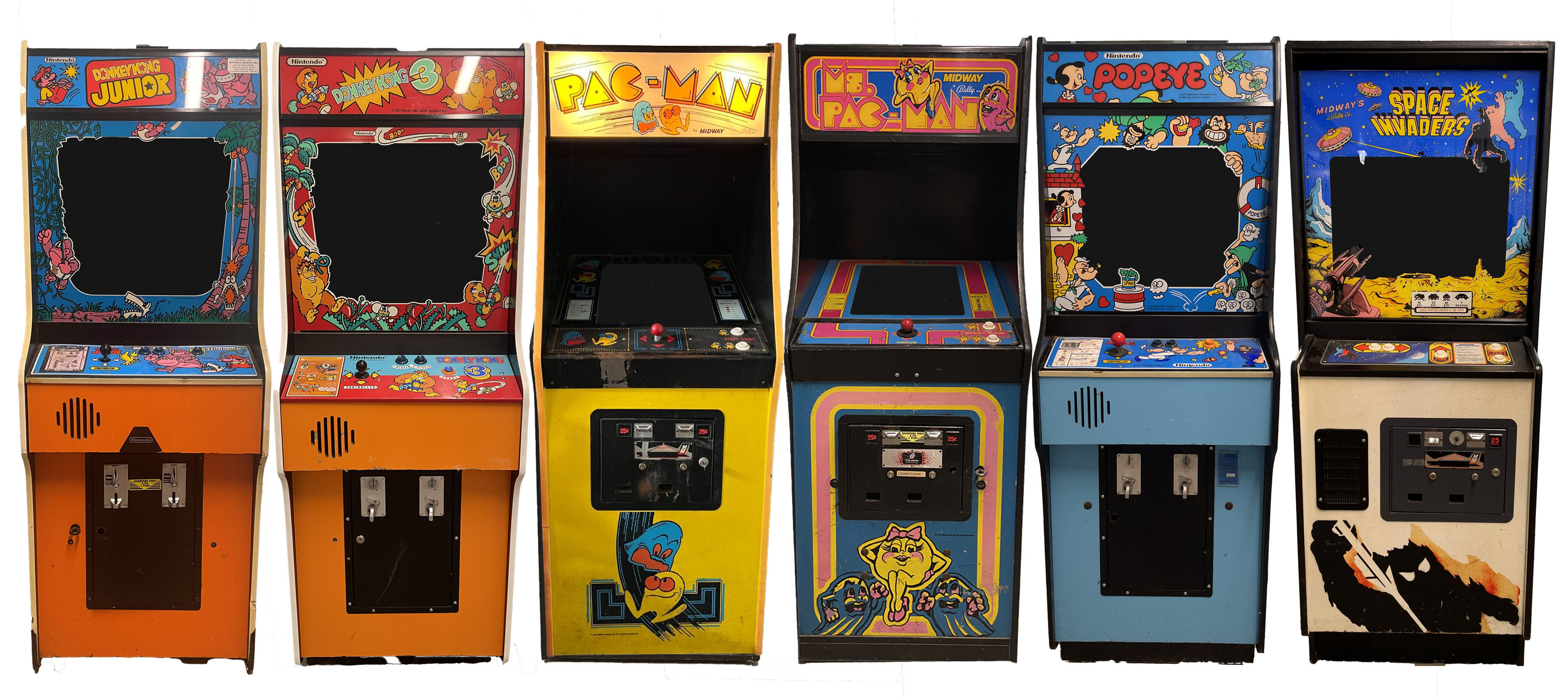Introduction:
Arcades and home consoles have long been intertwined, each influencing the other while competing for dominance. The rise of home consoles in the 1980s and 1990s coincided with the decline of arcades, but did consoles truly kill arcades? Or did arcades evolve into something different? This article explores the history, rivalry, and lasting impact of the arcade vs. console battle.

I. The Golden Age of Arcades (1970s - Early 1980s)
Arcades as the Pinnacle of Gaming
In the late 1970s and early 1980s, arcades were the pinnacle of gaming technology, offering experiences that home consoles couldn't match.
- Early video games like Pong (1972) and Space Invaders (1978) made arcades a social gaming hub, drawing players to compete and improve their skills.
- Titles like Pac-Man, Donkey Kong, and Street Fighter II dominated, creating an arcade boom. Arcades became a cultural phenomenon, where players of all ages would gather to test their abilities and claim leaderboard dominance.
- High-score leaderboards and local rivalries encouraged competitive gaming long before online play.
Nolan Bushnell, the founder of Atari, emphasized the communal experience of arcades during their heyday: "The arcades were a place where you could play games and socialize. It was a community experience."
The Console Challenge Begins
While the Atari 2600 (1977) introduced home gaming, early consoles were inferior to arcades in graphics and experience.
- Many early home games were watered-down versions of arcade hits, often featuring less responsive controls and weaker visuals.
- Arcade-to-console ports (Pac-Man, Donkey Kong) were crucial in proving consoles could deliver engaging experiences, but they often paled in comparison to the real arcade versions.
- Despite this, home gaming was more convenient, allowing players to enjoy games without needing a pocket full of quarters.
II. The Rise of Home Consoles (Mid-1980s - 1990s)
The Nintendo Revolution
The NES (1985) changed everything:
Toru Iwatani, the creator of Pac-Man, reflected on the evolution of gaming from arcades to home consoles: "Before 1983, there was only one place you could play the game, and that was the arcade. But after the release of the Nintendo console [NES], people started to play at home, which was actually an evolution of the video game industry."
- Faithful arcade ports (Super Mario Bros., Punch-Out!!) brought arcade experiences home.
- Exclusive console games like The Legend of Zelda and Metroid shifted focus away from arcades, providing longer, more immersive experiences that arcades couldn't replicate.
- The NES established the home gaming industry as a mainstream competitor to arcades, leading to more families investing in gaming systems.
16-bit Wars: Consoles Catch Up
By the early 1990s, the Sega Genesis (1989) and SNES (1991) narrowed the gap with arcade-quality visuals.
- Fighting games and sports titles (Mortal Kombat, NBA Jam) made the arcade-to-console transition smoother. The introduction of better controller designs and gameplay mechanics allowed console gamers to experience near-arcade-quality gaming from the comfort of home.
- Home console multiplayer improved, removing the need to go to an arcade for head-to-head gaming. Titles like Street Fighter II and GoldenEye 007 encouraged competition within the household, mirroring the arcade experience.

III. The Fall of Arcades (Late 1990s - 2000s)
Arcades Lose Their Edge
By the late 1990s, home consoles were catching up technologically and offering more convenience:
- PlayStation (1994) and Nintendo 64 (1996) introduced 3D gaming, surpassing most arcade experiences. Players could now experience deeper, more immersive worlds from their couches.
- Online gaming replaced local arcade battles, reducing the social appeal of arcades. With the rise of services like Xbox Live and PlayStation Network, players no longer needed to visit arcades to find worthy opponents.
- Home consoles now delivered near-arcade-quality games (Tekken 3, SoulCalibur, Crazy Taxi), further diminishing the need to visit an arcade.
Economic & Cultural Shifts
- The decline of malls and arcade locations hurt foot traffic, making it harder for arcades to sustain business.
- Quarter-based play couldn't compete with the affordability of home consoles, where a one-time purchase granted unlimited playtime.
- The rise of PC gaming and esports in the 2000s further weakened arcades. Competitive gaming had found a new home on the internet, with players engaging in large-scale tournaments from their bedrooms rather than local arcades.

IV. The Modern Arcade Resurgence
Japan Keeps Arcades Alive
Unlike in the West, arcades in Japan remain popular, fueled by:
- Exclusive arcade releases (Tekken 7, Initial D Arcade), which continue to draw competitive players.
- Innovations in rhythm games and card-based arcade experiences, such as Dance Dance Revolution and Wangan Midnight Maximum Tune, that still thrive in arcade environments.
- Many Japanese arcades have adapted by integrating online connectivity and digital payment systems, making them more accessible and modern.
The Barcade & Retro Revival
- Barcades (arcades + bars) revived arcade gaming for nostalgia-driven audiences in the U.S. and Europe. These establishments blend classic arcade machines with social drinking environments, creating a fresh appeal for older gamers.
- Classic arcade collections on modern consoles (Street Fighter 30th Anniversary, Arcade1Up cabinets) keep arcade culture relevant, ensuring that new generations can experience the golden age of gaming.
- VR arcades and esports arenas signal a possible return of physical gaming spaces. Locations like Zero Latency VR and esports lounges offer modern social gaming experiences that mirror the excitement of traditional arcades.

V. Arcades vs. Consoles: Who Really Won?
- Home consoles are clearly dominant, with widespread accessibility and a deep library of games.
- Arcade-style gameplay still exists in esports, fighting games, and online gaming culture, keeping the competitive spirit alive.
- Hybrid experiences (VR, arcade bars, retro collections) suggest arcades never fully died—they just evolved into a different kind of entertainment venue.
Conclusion
The arcade vs. console battle was never truly a fight to the death—rather, it was a mutual evolution.
- Without arcades, consoles wouldn’t have had their early foundation. Arcades set the stage for gaming innovation and competition.
- While arcades faded from mainstream popularity, their legacy remains strong, influencing gaming design, competitive gaming, and social gaming experiences to this day.
For many, the memories of crowded arcades, joystick duels, and the thrill of a high-score leaderboard remain a cherished part of gaming history. Whether in a classic arcade, on a console, or in a virtual gaming space, the battle between arcades and consoles continues to shape the way we play.
Primary Sources:
- Leonard Herman, "Phoenix: The Fall & Rise of Videogames"
- Atari's official history page.
- Interview with Pac-Man creator
- Interview Nolan Bushnell






